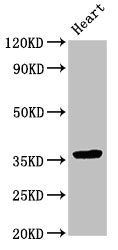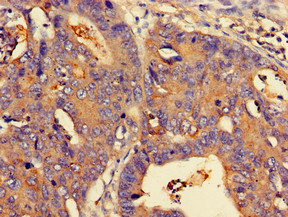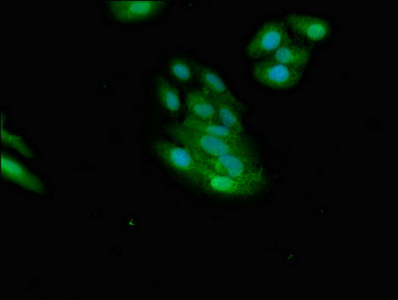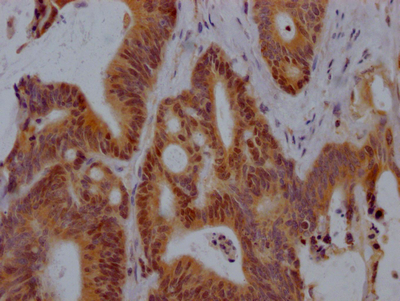NMI Antibody
-
货号:CSB-PA618768LA01HU
-
规格:¥440
-
促销:
-
图片:
-
Western Blot
Positive WB detected in: Rat heart tissue
All lanes: NMI antibody at 3.5μg/ml
Secondary
Goat polyclonal to rabbit IgG at 1/50000 dilution
Predicted band size: 36 kDa
Observed band size: 36 kDa -
Immunohistochemistry of paraffin-embedded human colon cancer using CSB-PA618768LA01HU at dilution of 1:100
-
Immunofluorescent analysis of HepG2 cells using CSB-PA618768LA01HU at dilution of 1:100 and Alexa Fluor 488-congugated AffiniPure Goat Anti-Rabbit IgG(H+L)
-
-
其他:
产品详情
-
产品名称:Rabbit anti-Homo sapiens (Human) NMI Polyclonal antibody
-
Uniprot No.:Q13287
-
基因名:NMI
-
别名:NMI antibody; N-myc-interactor antibody; Nmi antibody; N-myc and STAT interactor antibody
-
宿主:Rabbit
-
反应种属:Human, Rat
-
免疫原:Recombinant Human N-myc-interactor protein (62-202AA)
-
免疫原种属:Homo sapiens (Human)
-
标记方式:Non-conjugated
本页面中的产品,NMI Antibody (CSB-PA618768LA01HU),的标记方式是Non-conjugated。对于NMI Antibody,我们还提供其他标记。见下表:
-
克隆类型:Polyclonal
-
抗体亚型:IgG
-
纯化方式:>95%, Protein G purified
-
浓度:It differs from different batches. Please contact us to confirm it.
-
保存缓冲液:Preservative: 0.03% Proclin 300
Constituents: 50% Glycerol, 0.01M PBS, pH 7.4 -
产品提供形式:Liquid
-
应用范围:ELISA, WB, IHC, IF
-
推荐稀释比:
Application Recommended Dilution WB 1:500-1:5000 IHC 1:20-1:200 IF 1:50-1:200 -
Protocols:
-
储存条件:Upon receipt, store at -20°C or -80°C. Avoid repeated freeze.
-
货期:Basically, we can dispatch the products out in 1-3 working days after receiving your orders. Delivery time maybe differs from different purchasing way or location, please kindly consult your local distributors for specific delivery time.
相关产品
靶点详情
-
功能:Acts as a signaling pathway regulator involved in innate immune system response. In response to interleukin 2/IL2 and interferon IFN-gamma/IFNG, interacts with signal transducer and activator of transcription/STAT which activate the transcription of downstream genes involved in a multitude of signals for development and homeostasis. Enhances the recruitment of CBP/p300 coactivators to STAT1 and STAT5, resulting in increased STAT1- and STAT5-dependent transcription. In response to interferon IFN-alpha, associates in a complex with signaling pathway regulator IFI35 to regulate immune response; the complex formation prevents proteasome-mediated degradation of IFI35. In complex with IFI35, inhibits virus-triggered type I IFN-beta production when ubiquitinated by ubiquitin-protein ligase TRIM21. In complex with IFI35, negatively regulates nuclear factor NF-kappa-B signaling by inhibiting the nuclear translocation, activation and transcription of NF-kappa-B subunit p65/RELA, resulting in the inhibition of endothelial cell proliferation, migration and re-endothelialization of injured arteries. Negatively regulates virus-triggered type I interferon/IFN production by inducing proteosome-dependent degradation of IRF7, a transcriptional regulator of type I IFN, thereby interfering with cellular antiviral responses. Beside its role as an intracellular signaling pathway regulator, also functions extracellularly as damage-associated molecular patterns (DAMPs) to promote inflammation, when actively released by macrophage to the extracellular space during cell injury or pathogen invasion. Macrophage-secreted NMI activates NF-kappa-B signaling in adjacent macrophages through Toll-like receptor 4/TLR4 binding and activation, thereby inducing NF-kappa-B translocation from the cytoplasm into the nucleus which promotes the release of proinflammatory cytokines.
-
基因功能参考文献:
- These results revealed that IRF-1 is involved in the IFN-inducible expression of Nmi. PMID: 28913576
- Our study showed that NMI suppressed tumor growth by inhibiting PI3K/AKT, MMP2/MMP9, COX-2/PGE2 signaling pathways and p300-mediated NF-kappaB acetylation, and predicted a favorable prognosis in human lung adenocarcinomas, suggesting that NMI was a potential tumor suppressor in lung cancer. PMID: 29025423
- results provide new insights into understanding the regulatory mechanism of cancer stem cells and suggest that the NMI-YY1-hTERT signaling axis may be a potential therapeutic target for breast cancers. PMID: 28492540
- Damage-associated molecular patterns (DAMP) are important mediators of innate immunity. Here the s show that N-myc and STAT interactor (NMI) and interferon-induced protein 35 (IFP35) act as DAMPs to promote inflammation by activating macrophages via the Toll-like receptor 4 and NF-kappaB pathways. PMID: 29038465
- These investigations demonstrated etoposide-induced NMI can suppress tumor proliferation and promote cell apoptosis by activating the ARF-p53 signaling pathway in lung carcinoma. Our results provide an alternative mechanism for etoposide in lung carcinoma and suggest NMI has a critical role in suppressing lung carcinoma progression. PMID: 29030066
- Data suggest that N-myc (and STAT) interactor (NMI) could improve its downstream target bradykinin B2 receptor (BDKRB2) expression to induce extracellular signal-regulated kinases (ERK) 1/2 activation, and thereby further evoke malignant progression of hepatocellular carcinoma (HCC). PMID: 28077802
- N-Myc-interacting protein (NMI) negatively regulates epithelial-mesenchymal transition by inhibiting the acetylation of NF-kappaB/p65 in histone deacetylase-dependent manner. PMID: 27012186
- N-myc and STAT interactor sensitizes breast cancer cells to cisplatin treatment through DRAM1 dependent autophagy. PMID: 26146406
- Results show that aberrant miR-29 expression may account for reduced NMI expression in breast tumors and mesenchymal phenotype of cancer cells that promotes invasive growth. PMID: 25174825
- The results showed that SARS coronavirus protein 6 can promote the ubiquitin-dependent proteosomal degradation of Nmi. PMID: 25907116
- overexpression or depletion of NMI revealed its regulation on G1/S progression and cell proliferation (both in vitro and in vivo), and this effect was partially dependent on STAT1, which interacted with and was regulated by NMI. PMID: 25669971
- Trim21 regulates Nmi-IFI35 complex-mediated inhibition of innate antiviral response PMID: 26342464
- Its potential function in transcriptional activation of NMI. PMID: 25387807
- identified NMI induction as a novel negative feedback mechanism that decreases IRE1alpha-dependent activation of JNK and apoptosis in cytokine-exposed beta cells PMID: 24936061
- Thus our work reveals a novel NMI-mediated, transcription-independent ARF induction pathway in response to cellular stresses. PMID: 23034180
- Dissociation of the IFN-induced protein NMI from IFP35 is a newly defined specific cytoplasmic event occurring during apoptosis. PMID: 11911807
- complex with BRCA1 and c-Myc inhibits c-Myc-induced human telomerase reverse transcriptase gene promoter activity in breast cancer PMID: 11916966
- Apoptin mutant T1 still interacted with Nmi, suggesting that its C-terminal 11 AA was not essential for the interaction. PMID: 12019454
- STAT1 and Nmi are downstream targets of Ets-1 in MCF-7 human breast cancer cells PMID: 15996661
- identified an association of Sox10 with the N-myc interactor Nmi, which was mediated by the high-mobility group of Sox10 and the central region of Nmi; Nmi modulated the transcriptional activity of Sox10 PMID: 16214168
- The results provide a novel role of CKIP-1 in cytokine signaling response and the biochemical mechanism, by which two previously identified modulators IFP35 and Nmi are involved via interactions. PMID: 17197158
- Activation of PKCdelta in response to Camptothecin treatment requires Myc and is important in CPT-mediated apoptosis signaling. PMID: 17565738
- Data suggest that overexpression of Nmi inhibits the Wnt/beta-catenin signaling via up-regulation of Dkk1 and retards tumor growth. PMID: 19358268
显示更多
收起更多
-
亚细胞定位:Cytoplasm. Nucleus. Secreted.
-
蛋白家族:NMI family
-
组织特异性:Expressed in adult spleen, liver, and kidney. Expressed in fetal thymus, liver, placenta, spleen, lung, and kidney but not brain. Expressed in macrophages.
-
数据库链接:
HGNC: 7854
OMIM: 603525
KEGG: hsa:9111
STRING: 9606.ENSP00000243346
UniGene: Hs.54483
Most popular with customers
-
-
YWHAB Recombinant Monoclonal Antibody
Applications: ELISA, WB, IF, FC
Species Reactivity: Human, Mouse, Rat
-
Phospho-YAP1 (S127) Recombinant Monoclonal Antibody
Applications: ELISA, WB, IHC
Species Reactivity: Human
-
-
-
-
-
























